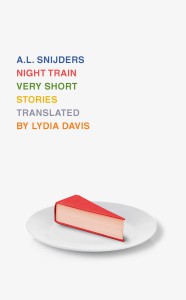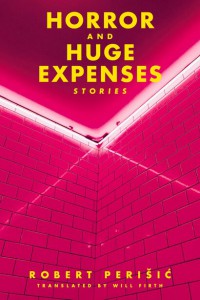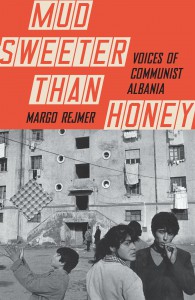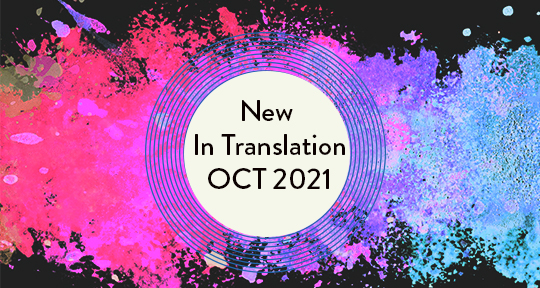This month, our selections of the best in world literature are unified by their writers’ undeniable strength of voice and masterful control of the narrative form. From the Netherlands, a collection of A.L. Snijder’s very short stories—a genre invented by their author—revels in the unreal natures of our reality. From Croatia, the dark humorist stylings of Robert Perišić masterfully delineate the unrealiable boundaries of nations and psychologies. And from Poland, reporter and writer Margo Rejmer brings us a rare and intimate glimpse at Communist Albania under the fractious rule of Enver Hoxha, from the people who lived through it.

Night Train by A.L. Snijders, translated from the Dutch by Lydia Davis, New Directions, 2021
Review by Thuy Dinh, Editor-at-Large for the Vietnamese Diaspora
“For more than fifty years I have cherished one wish: to travel. This wish is part of another wish: for reality without reality—stories that are indistinguishable from the truth.”
—A.L. Snijders, “Baalbek” from Night Train
The key to understanding A.L. Snijders’s very short stories (dubbed zkv—zeer korte verhalen) lies inside “Baalbek,” where the Dutch author connects his desire to visit Lebanon’s ancient Roman outpost with creating stories that depict “reality without reality.” The Stone of the Pregnant Woman, a megalith found in Baalbek and enshrouded with otherworldly presence, represents the perfectly magnified symbol for Snijders’s miniature approach. His Night Train—a collection of ninety-one zkv translated by Lydia Davis—is a shapeshifting amalgam of fable, zen koan, commentary, lyrical essay, and autobiography. As an immersive foray into the unknown, the instability of Snijders’s narrative form produces a trompe-l’oeil effect “indistinguishable from the truth,” giving the reader a sensation of being at once disoriented and illuminated.
Born Peter Cornelis Müller in 1937 in Amsterdam, Snijders came from a large, bourgeois Catholic family. The dual forces of freedom and order constitute the main themes of his life and work. Artistic and cosmopolitan, Snijders nevertheless chose a stable career teaching at a police academy and led a placid life as a gentleman farmer in rural Achterhoek, Holland’s eastern region. Even after being awarded the Constantijn Huygens Prize in 2010—one of the three most prestigious literary honors in Holland—Snijders did not, for years, deviate from the low-key routine of reading his work on an early morning radio show and circulating his steady flow of zkv among an email list of loyal readers. Ever industrious, he passed away this past June while working on new material.
The commonplace in Snijders’s oeuvre is imbued with mystery. In “Minor Characters,” Snijders’s alter-ego wonders if his compressed fiction may actually be “unpsychological novel[s] for people who understand nothing about psychology.” If reality resembles an unseen but anarchic mole emerging each night to turn Snijders’s garden into a surrealist landscape (“Mole”), then the author’s aesthetic philosophy suggests holistic means to affirm “what can never be understood.” This notion of reality as unknowable, or “unpsychological,” represents the trademark of Snijders’s fiction, allowing his narrative—as both burrowing animal and spy—to elude conventional expectations and assume an enigmatic depth, despite its compact form.
Specifically, “Carbide” represents Snijders’s sly restatement of the Chekhov’s gun principle, challenging the Russian writer’s notion that every element in a story must inevitably contribute to its narrative whole. While there is a gun in the story’s first paragraph (a reference to John Cheever’s “The World of Apples,” about an Italian man packing a rifle on a Sunday outing with his family), the explosion that follows in the second paragraph functions as both echo and non-sequitur; the source is a sealed carbide container of flammable gas and water, detonated by Snijders’s neighbor in celebration of the New Year.
Resisting linear interpretations, many of Snijders’s zkv, while told in clear, concise language, are unreliable texts—fairy tales veering toward nightmares, heroic deeds becoming problematic history. “Night Train,” the title story, brings to mind Belgian artist Paul Delvaux’s Le train de nuit (1947), and hints at sexual coercion or abduction as the subtext for romance:
[He] had decided to look for [a] wife in a night train . . . The woman would have to be sitting in a train that was traveling [toward] the Netherlands, she had to be on her way to [his] country . . . Fate was merciful to him, in the train he did indeed sit next to a woman he liked, but she said nothing to him; she couldn’t be bothered, he even thought she wasn’t aware of his presence. But because it was a night train, she fell asleep on his shoulder. They were married in Brussels . . .
In many of the stories, seemingly disparate elements are interlaced to illustrate or destabilize the theme in question. For example, Snijders’s “The Heart of the Story” refers in turn to “Spider,” a Christmas story in which a giant spider sculpture (reminiscent of Louise Bourgeois) appears. It also recounts his sister Rosalie’s abrupt renunciation of her family and Catholic faith in December of 1958. Rosalie’s dramatic gesture appears to reflect “the heart” of Snijders’s Christmas story, about leaving an oppressive past and coming into a more open, hopeful world of the future.
Lydia Davis, whose translation of Snijders’s “The Mole and Other Very Short Animal Stories” first appeared in Asymptote’s Fall 2011 Issue, describes—in Night Train’s introduction—her decision to translate the Dutch author’s work as both natural and explorative: a Goldilocks endeavor that turned out “just right.” Davis’s affinity for Snijders’s zkv seems intuitive, as she’s also a graceful practitioner of the short-short form in English. However, having no previous acquaintance with Dutch (besides recognizing its similarities to Old English, German, and Latin), Davis often had to be vigilant against faux amis and idiomatic syntax—a process thankfully mitigated by Snijders’s succinct prose. At times she wondered if translating his work while she was also learning Dutch represented a serendipitous “unlearning” or enlightenment—that translation “would seem to be exactly what it is so often misunderstood to be, by those who have no experience of it: all you need to do is read the text and then write it in English.”
Specifically, Davis’s discussion of linguistic false friends and true relations is mesmerizing, not unlike experimental poetry: how sleepboot is not “sleep boat,” or “sleep boot,” but “tugboat,” for the Dutch slepen is a cognate of the Yiddish shlep—to drag, haul, or carry—and thus its connotation of burden is the opposite of sleep. “Cork Oak”—“Kurkeik” in Dutch—is a deeply suggestive kzv that translates especially well into English. While the title refers to an evergreen Mediterranean oak (Quercus suber)—whose outer layer of bark is used for wine corks—the words cork oak and kurkeik are also onomatopoeic in suggesting the crowing of roosters, which in the story signifies both the promise of travel and intimations of mortality. In English, “cork oak” also sounds like “croak.”
Snijders seems to suggest in several of his zkv, such as “Pleasure,” “Passion,” and “Common Redstart,” that “perfection of the life is the same as perfection of the work”—refuting W. B. Yeats’s binary argument in “The Choice,” that an artist must choose one or the other. The Dutch author vividly demonstrates how recreational play and a passion for one’s calling are one and the same: a hare’s joyful leap through a winter landscape is analogous to a naturalist’s trance-like absorption in the movements of dragonflies and common redstarts, and two teenagers’ aimless trip to the seashore is not necessarily a rejection of their father’s advice that they should “never let go” of their “arbitrary goals” in life. This sense of work as both duty and pleasure represents Snijders’s netsuke approach to literature—intricate art designed as miniature toggles for the necessities of our daily existence.

Horror and Huge Expenses by Robert Perišić, translated from the Croatian by Will Firth, Sandorf Passage, 2021
Review by Kent Kosack, Educational Arm Director
Absurdity permeates Horror and Huge Expenses, an excellent collection of tragicomic short stories by Croatian writer Robert Perišić and translated by Will Firth. Throughout the collection, characters grapple with the collapse of the Soviet Union, the disintegration of Yugoslavia, the violent madness of ethnic nationalism and war, and the chaos of creating new countries and new economies.
The collection begins explosively with “A Wheel of Cheese.” An artillery shell whizzes by Martina, a young woman lugging an unreasonably large wheel of cheese to her parents in Slavonija; she ducks, but refuses to lie down completely because she doesn’t want to dirty her clean clothes. Later, her parents, hunkering down in their apartment, express their surprise at seeing her. In Perišić’s shrewdly penetrative prose, even such routine, pedestrian acts—visiting family, purchasing cheese, going upstairs for a glass of juice—are imbued with a madness amidst the insanity of war. As more shells explode nearby and Martina and her mother head to the basement, the two women sit in armchairs beneath the stairs and Martina pontificates on the wheel of cheese—how she bought it in Zagreb and took it camping with friends on the coast who had mocked her for it, and how she then became strangely, deeply invested in the fate of the cheese. She bails on her “friends” and eventually tries to abandon the cheese on the side of the road, but finds herself unable to. She picks up her burden again and wonders: “How long is this cheese going to dog me?”
Perišić deftly does this throughout the collection—imbuing objects with symbolic and ambiguous weight. Is the cheese a metaphor for the former Yugoslavia, and her inability to cut into it a sort of refusal to acknowledge her country’s disintegration? Is toting it everywhere a way for her to keep that history, and perhaps that hope, alive? This rich subtext is explored with a wry, punchy, almost hard-boiled voice that keeps the reader off-balance. Bombshells and wheels of cheese. Terrified people cackling in the ruins. When another shell hits while Martina is upstairs, the house rattles. She rushes downstairs and finds her mother has survived, and they greet each other with a fit of laughter: “. . . they both held their bellies and their laughter was spasmodic and lingering, as if they were calling for help.” What else can you do in the face of such absurdity, such destruction?
The absurdity intensifies as one reads on. In “Those Guys are Cracked,” soldiers blow up a door to break into a garage, only to discover it’s not only empty, but that the door on the side was open. The young narrator in “Something Flashed” recounts trying to sleep with his girlfriend as the war comes to Dalmatia. They head to his girlfriend’s apartment, but something flashes in the dark. Air raid sirens blare. Understandably unhinged by it all—the sirens, the mysterious flashing on the ships out at sea, the uncertainty—she runs off to her family. Perišić drops a comic beat into this panic-stricken scene as the war descends upon the scene:
“We have to go to their house, now, now, we have to go!” she wailed through her tears. “Jesus God, forgive me please!”
I didn’t know what to do.
“Jesus, where will I go?” I said.
Jesus said nothing.
A romantic evening full of erotic promise having been thwarted, the narrator is left frozen with fear, standing “at the door of someone else’s apartment in utter darkness, my dick limp.”
However, not all the stories are set in wartime. Just as in his similarly gripping and darkly comic novel No-Signal Area, Perišić also explores the aftermath. In “Debt Collectors,” Braco, a mechanic, debt collector, and small-time thug, has a mute son whom he brings along when his “associate” Leko picks him up for a debt collecting job. Braco wonders if his son secretly understands everything—the sobering fact that he might not have a better life than his father, that there’s no such thing as upward mobility in this new Croatia, that his father is numb inside, “just boredom and irritability.” Leko, screwing with Braco, jokes of a rumor that his son says nothing save for one word: Tudjman, the name of the first president of Croatia. Later, after they’ve collected the necessary debts (or have they? Can they? Can anyone? The title is, after all, Horror and Huge Expenses), Leko says he’ll give Braco’s son a cut of the pay if he can say “Tudjman.” Braco and Leko begin cackling uncontrollably, finally bonding through this mad laughter as they try to coax a mute child into saying the name of the president of their new country. The child doesn’t speak, but “as if newly awoken, shaking his head and his entire body, in a sudden euphoria of eyes, little teeth, and the hearty laughter of children, with a convulsion of his gentle palms, he started waving his arms, but it was clear he would never fly.”
The implication is that neither will the new Croatia.
Fittingly, the collection starts with a wheel of cheese and ends with a mouse. Coming in at just a single page, “Under My Shoe” is the shortest story in the collection. It’s almost more of a parable, a quiet and succinct metaphor for the trials of every character in the collection, of every character—us—in the story of the world. In it, a woman recounts to her friend about nearly stepping on a mouse at the market, and the mouse seeming to escape unharmed. They laugh about it, but the narrator urges us to consider the sanitary standards at the market, to consider the mouse. The collection ends with:
The mouse stands crookedly in its hole. Now it hurts a bit, now it doesn’t.
It just wanted to go on, ever and ever on, and don’t tell me you don’t understand.
Horror and Huge Expenses is good company as we sit crookedly in our burrows with this understanding, trying to dodge the next shoe.

Mud Sweeter Than Honey by Margo Rejmer, translated from the Polish by Zosia Krasodomska-Jones and Antonia Lloyd-Jones, MacLehose Press, 2021
Review by Filip Noubel, Editor-at-Large for Uzbekistan
A new generation of non-fiction authors from Central and Eastern Europe has emerged in the past decade, bringing to the literary landscape the “Other Europe,” that vast expanse which encompasses their region and continues to the Balkans, Turkey, and the Caucasus. They write also with a particular combination of an acute sense of familiarity, disillusionment with promises of the West, and irony—having themselves witnessed the fall of empires. In the stories they report from a more seldom-told Europe, they often recognize their own traumas.
Margo Rejmer is a well-established writer of what is known in this region as a “literature of the facts.” As a Pole who has lived extensively in Romania and Albania, speaking the local languages, she writes her own account of post-Communist societies. In 2013, she published Bucharest: Dust and Blood (excerpted in our Spring 2016 issue), a haunting portrait of the Romanian capital through the voices of its inhabitants and Rejmer’s personal recollections. Today, she comes to the anglophone reader with a translation by Zosia Krasodomska-Jones and Antonia Lloyd-Jones of her book, Mud Sweeter than Honey.
The book’s subtitle reads as Voices of Communist Albania, and indeed Rejmer does divide her work into five parts in which Albanians of varying genders, regions, and classes share their memories of Hoxhaism. This unique brand of conservative Communism was named after its dictatorial leader Enver Hoxha, who imposed his mix of isolationism, nationalism, and personal interpretation of Marxism-Leninism over the nation of three million people for almost four decades, until his demise in April 1985.
Albania truly represents a unique case in Communist history. It had aligned itself with all the powerhouses of the Communist block—Yugoslavia, the Soviet Union, China—and yet, eventually broke from all of them. After a final dispute with China in 1978, it sealed its borders and became, similar to North Korea, a hermit state in the heart of Europe.
Telling the stories that make up recent Albanian history as an external observer presents several challenges: gaining trust, overcoming the deeply seated self-censorship of witnesses, and avoiding the reduction of the complex narrative to an opposition of perpetrators and victims. Rejmer overcomes all these obstacles with a refreshing amount of brutal honesty. She lets the lived experience of Albanians speak for themselves, until the whole spectrum comes into view; from victims to survivors, heroes to collaborators, Rejmer puts to the page their pain and doubts, their own attempts at dealing with the different roles reality forced them into, their bitterness at the lack of justice in today’s Albania—for the past but also the present—and sometimes their accusations of Rejmer’s motivations for interviewing them.
Indeed, the voices, rendered in English by a seamless translation, stay with the reader long after the book’s final pages: “In a totalitarian system, no one has the right to speak the truth. No past service to your nation can protect you. That system fed on the blood of the Albanians, it was a bloodthirsty monster, so it was constantly on the hunt for human flesh. But as it became weaker from year to year, it needed more and more of that blood, and it sucked it from ever younger people. The older ones who stood up to the regime at the very start were immediately shot or simply disappeared. The system wanted blood in order to survive, it needed our terror.”
But there is probably no other better way to write about the Orwellian Albanian experience than applying the technique and style of literary reportage. In this regard, Polish writers certainly have an advantage; their reportage school is a unique phenomenon in Central Europe. It has given birth to institutions, awards, publishing houses, and new generations of writers and translators who specialize in what can be described as the union of journalism, literature, psychology, and dense prose. It has given the world authors who are widely acclaimed and translated: Szcygieł, Surosz, Stasiuk, Szabłowski, Gorecki, Krall. When I asked Rejmer what she thinks about this global success, she replied: “I guess it all started with the romantic myth of Kapuściński, his adventurous personality and the whole way of thinking about the world that he represents. Perhaps the breaking point in recent times was the publication of Gottland by Mariusz Szczygieł: It showed a new way of writing non-fiction—very literary, focused on a form and composition, as almost every sentence had a literary twist.”
Yet despite having mastered that technique, Rejmer acknowledges that writing book on Albania remained a daunting task. She explains the difficult choices she faced in the process: “On one hand, I had to hear a story with as many details as possible. On the other hand, I had to be cautious with the character in order to avoid triggering too many bad emotions or leaving them feeling miserable. Sometimes I felt powerless: I can’t really help someone who experienced trauma, I can only write down their story. Two of my characters have already died, so their stories have a special value for me now. Sometimes it took me weeks to recover after hearing some of them speak. I guess the biggest challenge is to find a way to get deeper into the narrative, and eventually draw out a universal meaning, something that will be intuitively understood everywhere.”
What is perhaps most disturbing is the fact that Albanian society has not been able to face the many traumas of its past—which continue to shape politics, power relations, and even the psychology of many of its inhabitants to this day. As one interviewee says: “The young people need to learn about the crimes of communism, but as no one has been punished, what kind of lesson are they gaining from the past? Sometimes I give talks in schools about what it was like in prison, but the kids just shake their heads and say: ‘No, that’s impossible.’ Nowadays, people only go to prison if they commit a serious crime, so the young people can’t conceive of someone being convicted without being guilty.”
Rejmer gives her own explanation about today’s silence in Albania: “We are talking about a society where people keep repeating to this day that every fourth citizen was an informant to Sigurimi, the political police. When communism collapsed, there was no change of guard, because there was no opposition. Intellectuals who wanted to enter politics entered the heart of darkness. For many, politics was just a way to get rich as quickly as possible. It is believed that those who pulled the strings decades ago are still in power or their children are in power. That is why many victims of the system are constantly afraid and therefore have no political will to carry out vetting. Only the victims of the regime and their relatives have access to Sigurimi’s files, and there is a belief that after so many years vetting no longer makes sense, because the key files have long ago dissolved, have been burned or sold. The truth could free Albania, but it is easier for all interested parties to live a lie.”
One of the voices, no longer alive, gives what is perhaps the most chilling account of this inability to deal with the past: “In the new Albania, the truth doesn’t count. What use is it to anyone? You can’t sell it or buy it. People have stopped hoping that the truth will bring liberation, that it will cleanse Albania. The world is still covered in mud. I don’t want to take that mud with me to the grave.”
*****
Read more on the Asymptote blog:

